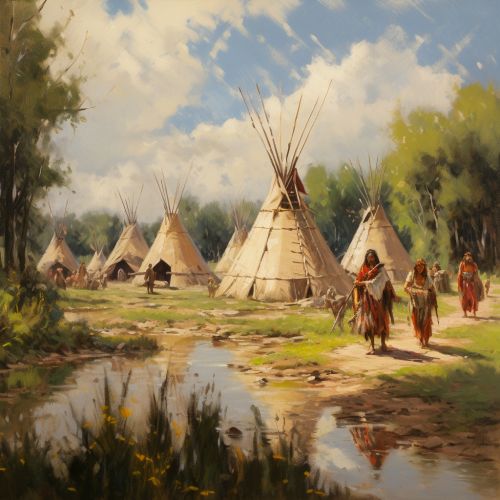History of the United States
Pre-Columbian era
The history of the United States begins with the arrival of Native Americans in North America around 15,000 BC. Numerous indigenous cultures formed, and many disappeared in the 1500s. The arrival of Christopher Columbus in 1492 started the European colonization of the continent.


Colonial period
European settlers came from a variety of social and religious groups. English attempts to settle North America began with the lost colony of Roanoke in 1585. The first successful English colony, Jamestown, was established in 1607 on the James River in Virginia.
American Revolution
The Revolutionary War was fought from 1775 to 1783. It was a civil war between the Thirteen Colonies and the British Crown. The colonies declared independence in 1776 as the United States, under the leadership of General George Washington and with the assistance of France.
Early Republic
The Constitution, adopted in 1787, established a strong federal government with an intricate system of checks and balances. George Washington, who had led the revolutionary army to victory, was the first president elected under the new constitution.
Civil War
The Civil War was fought in the United States from 1861 to 1865. The Union faced secessionists in eleven Southern states grouped together as the Confederate States. The Union won the war, which remains the bloodiest in U.S. history.
Industrial Revolution
The Industrialization of the U.S. economy, which began in the early 19th century, was characterized by the mechanization of industry and the expansion of factories and railroads.
World Wars
The United States remained neutral in World War I until 1917 and in World War II until the Japanese attack on Pearl Harbor in 1941. The U.S. played a major role in both wars, helping to tip the balance in favor of the Allies.
Cold War
The Cold War was a period of geopolitical tension between the United States and the Soviet Union and their respective allies, the Western Bloc and the Eastern Bloc, which began following World War II.
Post-Cold War era
The post-Cold War era saw the end of the Cold War and the rise of globalization. The United States became the world's sole superpower and faced new challenges and opportunities in the global arena.
See Also
- History of Native Americans in the United States
- Colonial history of the United States
- American Revolutionary War
- History of the United States Constitution
- American Civil War
- Industrial Revolution in the United States
- United States in World War I
- United States in World War II
- Cold War (1947–1991)
- Post–Cold War era
